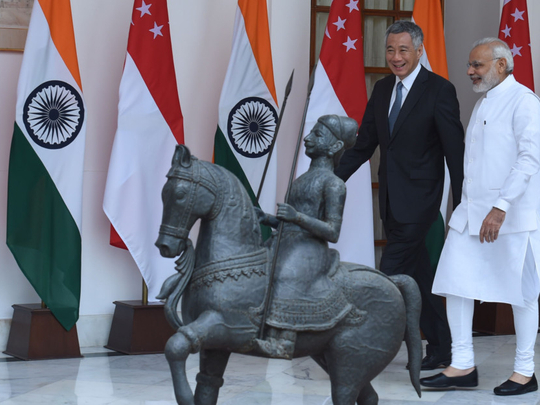
New Delhi: With terror attacks continuing to emanate from Pakistan, Prime Minister Narendra Modi on Tuesday described cross-border terrorism and radicalisation as “grave challenges to our security”, while visiting Singapore Premier Lee Hsien Loong condemned terrorism in all its forms.
“Rising tide of terrorism, especially cross-border terrorism, and the rise of radicalisation are grave challenges to our security,” Modi said in a joint press statement with Lee after delegation-level talks between the two sides here.
“They threaten the very fabric of our societies,” Modi said.
“It is my firm belief that those who believe in peace and humanity need to stand and act together against this menace,” Modi added.
The prime minister’s remarks came following the September 18 cross-border terror attack on an army unit at Uri in Jammu and Kashmir that claimed the lives of 19 Indian soldiers and the attack on an army camp at Baramulla on Sunday in which a BSF trooper was killed.
Following the Uri attack, India pulled out of the South Asian Association for Regional Cooperation (Saarc) Summit that was scheduled to be held in Islamabad in November, citing Pakistan’s sponsorship of terrorism as the reason.
The Indian Army also carried out surgical strikes on terror launch pads across the Line of Control in Jammu and Kashmir in which “significant casualties have been caused to the terrorists and those who are trying to support them”.
In Tuesday’s joint press statement, Singapore’s Lee, while condemning terrorism in all its forms, extended his condolences to the families of the victims of the Uri attack.
Modi said that India and Singapore have agreed “to enhance our cooperation to counter these threats, including in the domain of cyber security”.
“Our defence and security cooperation is a key pillar of our strategic partnership,” he stated.
“As two maritime nations, keeping the sea lanes of communication open, and respect for international legal order of seas and oceans is a shared priority,” Modi said.
“Our cooperation in the framework of Asean [Association of Southeast Asian Nations], East Asia Summit and the Asean Regional Framework is aimed at building an open and inclusive architecture for regional cooperation, in an atmosphere of trust and confidence.”
Modi said trade and investment ties formed the bedrock of the India-Singapore bilateral relationship.
Stating that the two sides enjoyed a strong network of business to business partnerships, he said: “In this context, Prime Minister Lee and I have agreed to expedite the second review of our Comprehensive Economic Cooperation Agreement.”
Following Tuesday’s delegation-level talks, India and Singapore signed three memoranda of understanding (MoUs).
One MoU was signed between Singapore’s Institute of Technical Education (ITE) Education Services (ITEES) and India’s National Skill Development Corporation on collaboration in technical and vocational education and training.
Another MoU was signed between the Assam government and ITEES Singapore, also on collaboration in technical and vocational education and training.
A third MoU was signed in the field of industrial property cooperation between India’s Department of Industrial Policy and Promotion (DIPP) and Intellectual Property Office Singapore.
“Prime Minister Lee and I also welcome the issuance of corporate rupee bonds in Singapore,” Modi said.
“It is a step forward in our efforts to mobilise capital for India’s large infrastructure development needs.”
Recalling his visit to Singapore in November last year, the Indian Prime Minister said that the bilateral relationship was upgraded to the level of a Strategic Partnership with “renewed spirit, new energy”.
“To deliver benefits to both our people, our partnership aims to combine the strengths of Singapore with the scale of India; and dynamism of Singapore with vibrancy of our states,” Modi said.
Affirming the importance of the bilateral ties, Prime Minister Lee said that Singapore was a firm believer in India and would contribute where it can.
Earlier on Tuesday, External Affairs Minister Sushma Swaraj called on Lee here.
The Singapore prime minister, accompanied by a high-level delegation, arrived here on Monday on a five-day bilateral visit to India.
Lee will call on President Pranab Mukherjee on Wednesday before leaving for Udaipur where agreements are expected to be signed between Singapore and the Rajasthan government.












